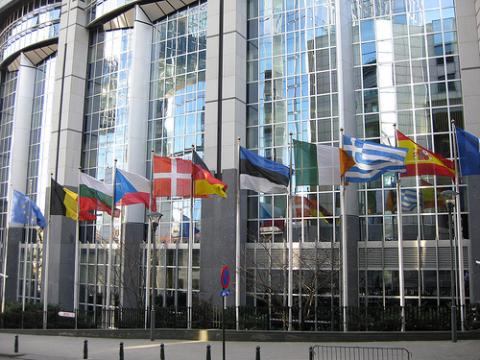Bowing to Europe is against the national interest

Monday, May 9, is a day of national debasement - otherwise known as Europe Day, writes Vincent Browne
It will witness a special obeisance in Dáil Éireann, where our elected representatives - or at least the vast majority of them - will sit respectfully as party leaders intone their deference to the European institutions. These are the same institutions to which we have surrendered a large chunk of our sovereignty under threat of ''immediate and terrible war'' - to re-coin the threat of Lloyd George to the Irish plenipotentiaries during the Treaty negotiations on December 5, 1921.Well, not quite war, but with consequences almost as calamitous.
One of our more fevered Euro-fans, Lucinda Creighton, the new Minister of State for European Affairs, has said that this event will ''mark Ireland's arrival back in the centre of European political and cultural life''. Taoiseach Enda Kenny, according to the official timetable, ''will deliver a statement taking stock of our relations with Europe and reaffirming our commitment to the ideals that underpin the European Union''.
Then Máire Geoghegan-Quinn will deliver a rebuke to those us who do not sufficiently appreciate Europe's indulgence of Ireland. And, to heighten the excitement even further, Ireland's MEPs will be asked questions by TDs.
As part of the celebration, Eamon Gilmore will get to visit London, Paris and Berlin in the next week or so, while Creighton will be travelling non-stop. And, by the way, Joe Higgins – the main spokesman in the Dáil who, as it happens, is unlikely to share in the celebration of Europe Day - will not be allowed to speak at this special event.
It is time to take stock of our relationship with the European Union. There have undeniably been positive elements.
Membership of the huge single market gave our economy the opportunity to grow, even if it took over 20 years for this to be a benefit. That, in turn encouraged foreign direct investment here, which has generated 100,000 jobs. Not quite the bonanza we are often told about – out of a total workforce of 1,900,000, the 100,000 is not of enormous significance.
Membership of the European Union (as it has become) was also of significance in lessening the cultural isolation that prevailed here from independence.
We were also the beneficiaries of the Common Agriculture Policy, structural funds and cohesion funds, to the extent of around €70 billion, which is quite something. But now that we have become net contributors to the EU - and much more so in 2013 - the net EU contribution to us is probably around €50 billion.
This is still pretty impressive. But when account is taken of the loss to the Irish economy by forfeiting our fishery rights, it is a good deal less impressive. In 1993, according to the Irish naval authorities, €1.3 billion worth of fish was taken from the 200-mile Irish exclusion economic zone (Irish Times, September 11, 1993).
That same report quoted an unnamed senior Defence Forces official as saying: ''If we replaced the Spanish and French vessels with Irish boats, we could solve our unemployment problem."
The forfeiture of Irish fisheries occurred during the accession negotiations of 1972, consolidated by a further surrender in 1994. But the loss to Ireland of its fishing industry - or what could have become our fishing industry - probably cancels out the net benefits we have received since accession in 1973. (The full story and cost of the surrender of fishing rights has not been told as yet. Karen Devine of the department of government and law in DCU is preparing a paper on this very subject, and she provided some of the data for this column.)
Almost certainly, in the coming year or so, there will be a further surrender on the corporation tax issue, whatever protests to the contrary are made in the meantime. Again, there will be a very considerable cost.
But the more recent developments are the most problematic. The insistence of the European Central Bank that no bank should be allowed to fail was a factor in the calamitous decision of September 29, 2008, to give the banks a blanket guarantee. (In fact, the ECB was infuriated by the comprehensive scale of the Irish guarantee, which caused problems for several other EU member states.) But the earlier insistence on no bank failing was a factor.
Much more serious has been the nature of the ''rescue'' deal negotiated last November, a deal forced on us partly because of that calamitous guarantee.
The enforced surrender of much of our sovereignty is hardly to be celebrated; nor are the onerous interest rates that are being demanded. But, worse than that, we are threatened with ''immediate and terrible war'' if we refuse to compensate even unguaranteed senior bondholders, at a cost to us of tens of billions of euro.
Neither has the euro proved of great benefit to us. Certainly, if we now had the flexibility to devalue our currency, that would go some way towards restoring growth, although at a price in other respects.
But none of this ''negativity'' will be heard on Europe Day in the Dáil today - just the usual obsequiousness and timid compliance with the demands of our new masters.
